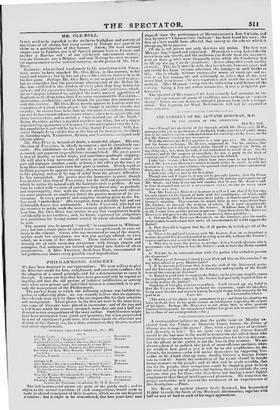Till': CONDUCT OF M IL Elavti'A RD HOB SM A
N, M. P.
TO EDITOR OF THE SPECTATOR.
WA an elector of flie borough which Mr. Ifous:.1.1a. M.P., misrepresents, yi.t. as an advocate of the Balot, I take leave to call public :wens tion to his condoet rn his celebrated motion for counting out the house, on the day Mr. GROTE'S :maim was to Mille OM 1Vith the electors the Ballot question is it sine qua non. 3fr. At:t.sosnar, and his former colleague, Mr. l)vves, supported it. Out 116 election, Mr. Eown RD HOLISM.% a did not indeed pledge himself to support the Ballot, or any thing else; but, from his talk, it was understood he watild du so. (!n the contrary, and to the surprise of' everybody, he was a party to the trick of counting out Op House when the question was to be debated. I take lcay.• 01 state a few facts which have since come to my knowledge; and if Mr. EowAlto HOnsMAN wishes to stand rectos in curio, be will not hesitate to arswer, its your coluhoua. the queries I shall put to him—and answer them, too, dit;rtly and unvquivocally.
I shall state a fact or two its the first place.
Though you nal I know it, it may not be generally known, that the Muse of Commons was counted out altogether without the privity and ennoinanee of Mr. Grote ; and that, if any one told another that it was Mr. Grotr's wish to hare it counts'! out, A STATEMENT NEVER OUGHT TO HAVE BEEN MADE BY ANY ONE.
Now, Mr. Enwa n lloasm AN is aware as well as I nm, that if he has any, his only excuse fur the breach of faith with his constituents—of which, until satisfactorily extiained, I shall assume he is guilty—is that he acted upon Mr. GROTE'S sanction. This sanction he might have in two ways, direct front Mr. GROTE, or through the medium of others. It is most unequivocally deuied that he had it directly from Mr. GROTE. It follows then, if he had It at all, it came front another person or persons. Upon these facts Mr. Euevaito lloasai,N will perceive the necessity of answering- these questions- ]. Did not he, Mr. Eow A RD HORSMAN, on the hustings, give his consti- tuents reason to understand that under all circumstances be would support the Ballot?
2. flow then did it happen that he, of all parties, by a trick got mid of the motion for it ?
3. What is his political intitriley with Mr. GI:OTT, that, on so important a matter, he could feel himself justified in acting as he dill, without 3Ir. Games express and personal assent to the motion ? 4. Who was or were the person or persons—it is a Scotch advocate who is questioned—who told him it was Mr. Gitosa's wish to have the House counted out?
5. Was not he in communication with the parties who wished to prevent the discussion?
6. What passed between Colonel Laaan Ilay and him on this occasion? or any other official or party Ministerialist ? 7. If lie was not well aware that it was the wish of the Ministerial party, and the Tories possibly, to prevent the discussion, and especially of the former to avoid the consequrrit division? 8. Bound in good faith to support the Ballot, can he give any tangible reason for neglecting his duty, supposing Mt. GROTE had personally requested Lim to do so by making the motion? Suspicion of nail play attaches somewhere. Until cleared up, my belief is that Mr. EDWARD lions3iA a furthered the manceuvre, under the Idea that, being a new Member and seareely known, lie might escape with impunity for his
[The writer of the above is not anonymous to us; and from his situation we have no doubt that he has good sources of intelligence respecting the subject of his letter. Perhaps Mr. llonsmas is not aware that, in other quarters besides Coekermouth, his unexplained conduct has given rise to remarks simi- lar to those of our eorrespnndeut.—Eli.]


























 Previous page
Previous page